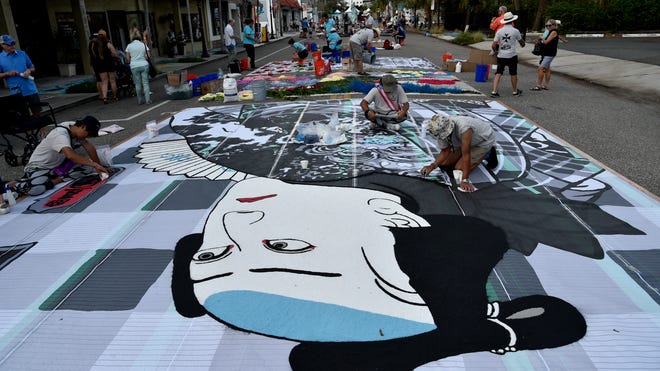The Sarasota County Commission has approved new guidelines for how arts and cultural organizations will qualify for tourist tax funding, requiring electronic ticketing or specific entry points, surveys of participants to measure tourist attendance and greater spending on marketing specific programs.
The new guidelines were proposed by the Arts and Cultural Alliance for Sarasota County, which has overseen the tourist tax grants for arts funding since 1997, after commissioners last year expressed concerns about the process and vetoed funding for three organizations – Embracing Our Differences, WSLR + Fogartyville and the Chalk Festival.
In July, the commission also put a hold on approving a renewal of the alliance’s roughly $285,000 contract to operate the granting process.
Commissioners praised Alliance CEO Brian Hersh and his work with county staff to develop the new guidelines.
“You heard us and provided us everything we asked for,” Commissioner Ron Cutsinger said before a unanimous vote to approve the process.
Though no funding has yet been awarded under the new guidelines, Commissioner Mark Smith said, “We did have some concerns that the quality of the work was going to be diminished perhaps, but I’m glad to hear it’s not. We’ve got a reputation of being a cultural center and we don’t want to see a drop in quality.”
The new guidelines all but guarantee that Embracing Our Differences will not qualify for funding because it is presented at the City of Sarasota’s Bayfront Park, where it is not allowed to sell tickets to visitors for the outdoor art display. Wertheimer and others have claimed that commissioners, in calling for the ticketing, were specifically targeting Embracing our Differences because its exhibit promotes diversity, inclusion and respect in the artwork and inspirational messages.
The Chalk Festival sold tickets for people to attend its return to downtown Sarasota.
But events usually attract thousands of people.
Commissioners, however, said they wanted to see a return on investment in terms of funded events attracting people from outside the area.
Each year, a portion of the tax tourists pay on hotel stays and short term rentals, is allocated for arts and culture programming with a focus on shows and events that might attract tourists. Last year, 35 arts and culture programs shared $2.1 million. The total fluctuates depending on tourism levels.
Usually, around 40 organizations apply for and receive funding based on past criteria, but the process will be different this year.

Arts Newsletter:Sign up to receive the latest news on the Sarasota area arts scene every Monday
What changes are being made?
The new rules change the definition of local from patrons who live in Sarasota, to people in live in Sarasota, Manatee and Charlotte counties.
Organizations will have to use electronic ticketing or have a staffed entry point where visitor data is collected.
Arts groups will have to state how they will send a survey with pre-defined questions to 100% of ticket purchasers and/or offer this survey to all visitors for programs without electronic ticket sales. Applicants will have to report the ZIP codes of those buying tickets.
In years past, the size of an organization’s budget determined how much it could request. Now, organizations must meet certain requirements regarding attendance goals, budget size and financial documentation. Requests top out at $125,000 for the largest organizations.
The measurements to score applications will now put greater emphasis on the tourist appeal of the programs, raising it from 50 points to 65 points out of 100. It lowers artistic/cultural significance from 30 points to 20 points, and drops administrative competence from 20 to 15 points. The rubric used to score applications now puts greater emphasis on the tourist appeal of the programs at 65%. Artistic/cultural significance drops from 30 points to 20 points, and administrative competence drops from 20 to 15 points.
Organizations must spend 50% of grant funds on marketing expenses solely related to the project being funded. Money can not be used for salaries, other marketing or branding efforts.
Hersh said the granting season will begin Feb. 5 when eligibility forms will become available. The grant application deadline is April 1, and the Tourist Development Council will review awards recommendations in June, followed in July by approval from the County Commission.
Follow Jay Handelman on Facebook, Instagram and BlueSky Contact him at [email protected]. And please support local journalism by subscribing to the Herald-Tribune.

